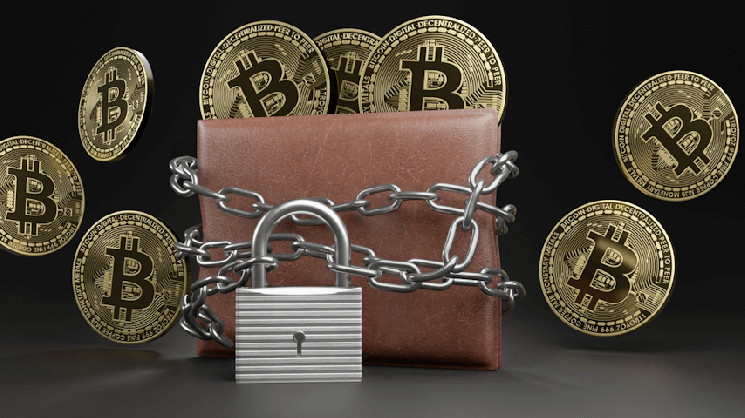Storing cryptocurrencies privately and securely requires a non-custodial wallet that offers anonymity. This means you won't be required to trust a custodian, let alone provide any personal information.
In this guide, we rank and review the top 10 anonymous crypto wallets for 2023. Read on to discover the leading anonymous wallets for security, convenience, features, and fees.
Best No KYC Crypto Wallets Shortlisted
Listed below are the 10 leading anonymous crypto wallets for 2023:
- Best Wallet: Best Wallet is a non-custodial wallet that supports thousands of cryptocurrencies. This includes Bitcoin and all tokens on the Ethereum and Binance Smart Chain networks. Best Wallet offers solid security features, including two-factor authentication and biometrics. It comes as a mobile app for iOS and Android, and also offers anonymous staking, token swaps, and access to newly launched projects.
- MetaMask: MetaMask is a popular crypto wallet that offers full anonymity. While it doesn't support Bitcoin, MetaMask is compatible with several blockchain networks. This includes Ethereum, Avalanche, Fantom, and Polygon. MetaMask doesn't charge markups when sending cryptocurrencies to another wallet. Supported devices include iOS, Android, and browser extensions.
- Trust Wallet: Trust Wallet is an anonymous wallet that comes as a mobile app. It also offers support for browser extensions, including Chrome. Trust Wallet supports millions of digital assets, including Bitcoin, Ethereum, Cardano, Solana, XRP, and BNB. Trust Wallet comes packed with features, including staking and access to decentralized applications.
- Coinbase Wallet: Coinbase Wallet is a separate entity from the main Coinbase exchange. It's an anonymous, self-custody wallet that gives you full control of your private keys and cryptocurrencies. It supports dozens of blockchain networks, including Bitcoin, Ethereum, Solana, and Polygon. Coinbase Wallet comes as a mobile app for iOS and Android.
- Electrum: Electrum is a desktop wallet that allows you to store Bitcoin anonymously. Compatible with Mac, Windows, and Linux, Electrum offers many security features. This includes proof checking, multisig permissions, and cold storage. No other cryptocurrencies are supported by Electrum and the software is completely free to use.
- Coinomi: Coinomi is another established crypto wallet that offers anonymous storage. Launched in 2014, Coinomi supports over 125 blockchain networks. This includes Bitcoin, Ethereum, TRON, and Binance Smart Chain. Custom tokens can also be added via their unique smart contract address. Coinomi comes as desktop software and a mobile app.
- Atomic Wallet: Atomic Wallet offers a free decentralized wallet for Windows, Mac, iOS, and Android. It supports more than 1,000 cryptocurrencies, including Bitcoin, XRP, Ethereum, and Litecoin. No personal information is required when using Atomic Wallet, so you'll remain anonymous at all times.
- MyEtherWallet: MyEtherWallet allows you to store Ethereum-based tokens anonymously. It supports all cryptocurrencies on the ERC20 standard and enables you to add custom tokens. MyEtherWallet offers in-built staking tools for Ethereum 2.0, not to mention integration with decentralized applications. This enables you to swap ERC20 tokens.
- Exodus: Exodus supports more than 50 blockchain networks, including Bitcoin, Ethereum, Monero, and Binance Smart Chain. It supports all device types, including a mobile app, desktop software, and browser extensions. Private keys and transaction data are stored on your device, so Exodus offers complete anonymity.
- iToken: iToken offers a decentralized, self-custody wallet for iOS and Android phones. Although the wallet is backed by the Huobi exchange, it operates independently. You'll have full control of your cryptocurrencies and private keys. Plenty of networks are supported, including Binance Smart Chain, Solana, and Ethereum.
Top Anonymous Bitcoin Wallets: Full Reviews
We'll now review the no identification crypto wallets listed above. We cover everything you need to know about each wallet, such as security, privacy features, supported networks, and pricing.
1. Best Wallet - Anonymous Crypto Wallet With an In-Built Decentralized Exchange
Our number one pick is Best Wallet, which offers an anonymous wallet experience in a safe and secure environment. Best Wallet comes as a mobile app for iOS and Android, it is suitable for beginners and experienced investors alike. Crucially, Best Wallet is a self-custody wallet, meaning you're the only person to have access to your private keys.
Not even Best Wallet can view your credentials, so you'll be able to store cryptocurrencies in complete privacy. What's more, Best Wallet comes packed with security features. When first setting the wallet up, you'll be asked to choose a PIN. Fingerprint ID is also supported, alongside two-factor authentication.
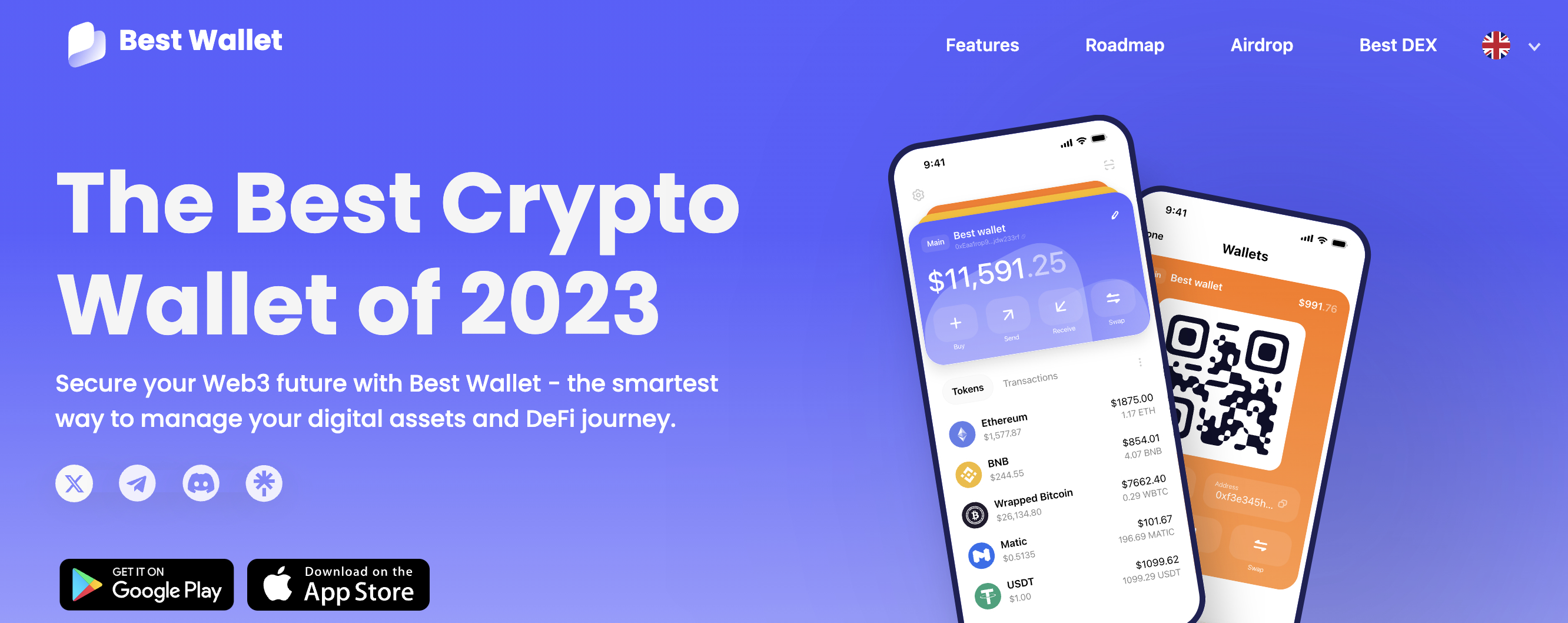
As an additional security measure, Best Wallet will collect your email address. This is in case you lose your mobile device and need to regain access to the wallet. You can also choose a unique alias. This allows you to receive cryptocurrencies, so there's no requirement to enter complex wallet addresses.
In terms of supported cryptocurrencies, Best Wallet is compatible with Ethereum and Binance Smart Chain. Any tokens on these networks can be stored. Bitcoin and other popular cryptocurrencies will be added in the near future. This is because Best Wallet is a new wallet provider, so some features are still being worked on.
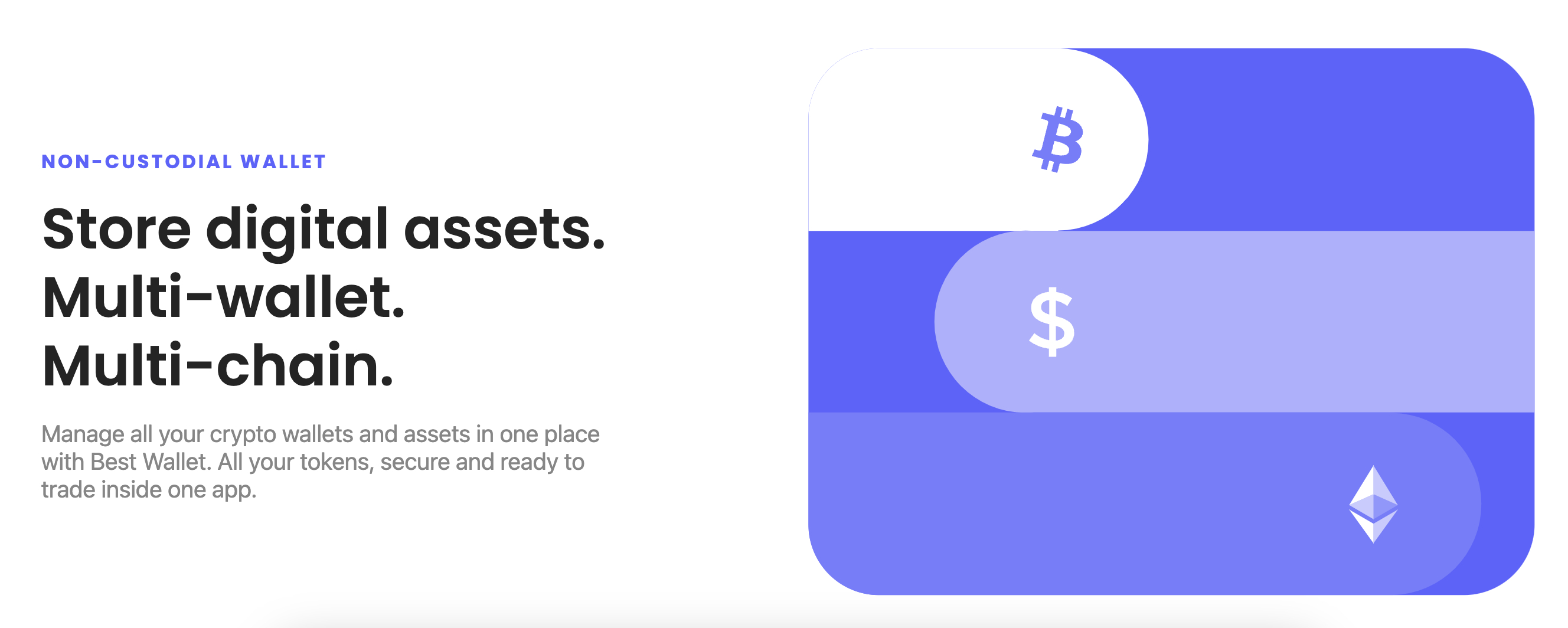
In addition, Best Wallet doubles up as a decentralized exchange. This means that you can swap tokens without leaving the wallet app. For example, suppose you're currently storing ETH. If you want to buy USDT, you can instantly swap it for ETH without paying any commissions. That said, you'll need to pay a small fee to the liquidity provider.
Many other features will be launched in the coming months. For example, Best Wallet will integrate a staking tool. This allows you to earn passive income on cryptocurrencies stored in your wallet. Best Wallet will also support NFTs and a launchpad for new cryptocurrencies. We also found that Best Wallet will integrate TradingView into its wallet app.
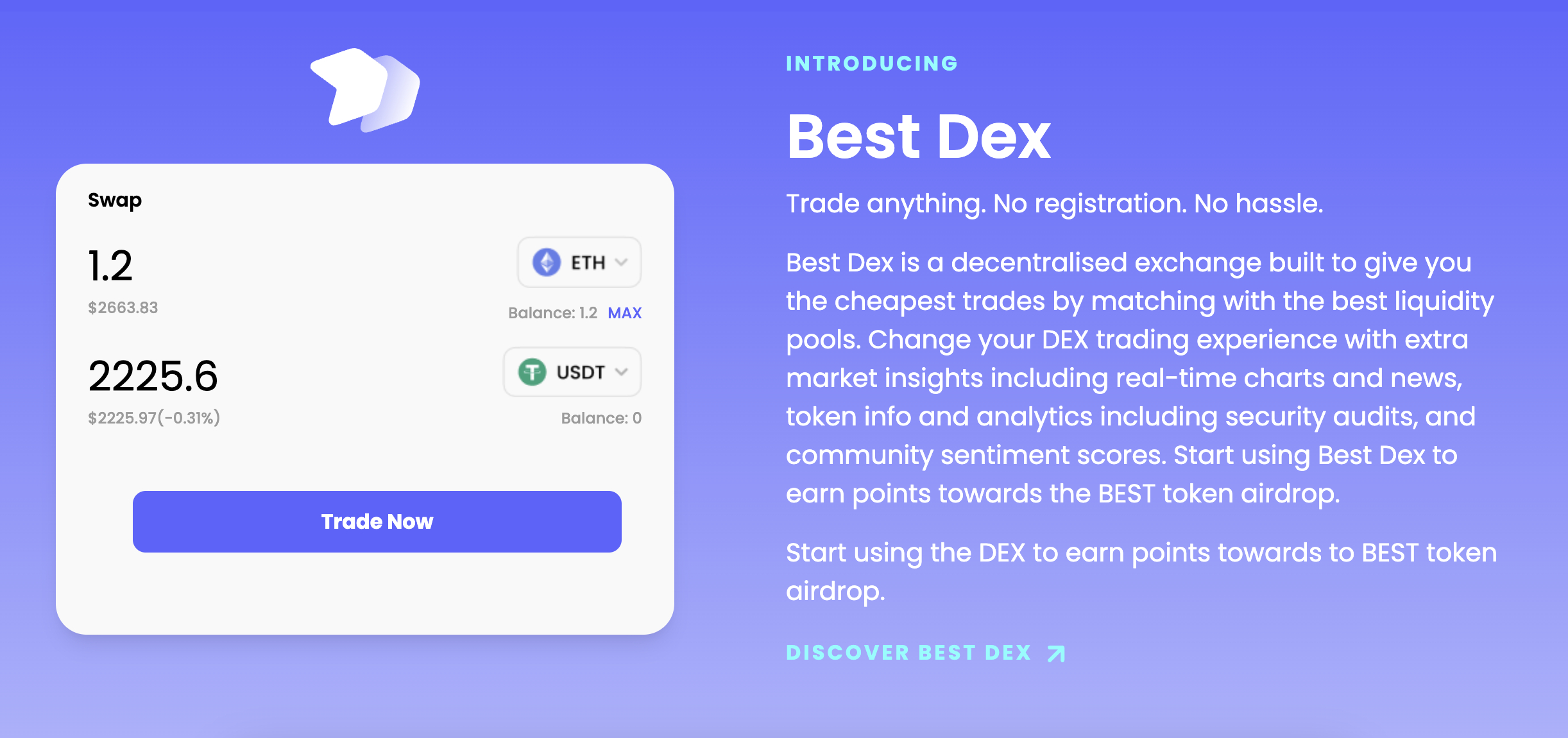
This allows you to research the top trending cryptocurrencies through charts and technical indicators. Best Wallet will also be launching its own cryptocurrency called BEST. This will offer perks to Best Wallet users, such as airdrops and voting rights. There could also be an upside on BEST tokens, as they'll soon be listed on crypto exchanges.
| Supported Networks | Ethereum and Binance Smart Chain. Bitcoin and other networks will be added soon |
| Fee to Buy Crypto | Swap fees are determined by the liquidity provider. Best Wallet does not add a markup |
| Devices | iOS/Android app |
| Top Features | Anonymous Bitcoin wallet with self-custody storage, Swap and stake tokens within the wallet app, Solid security features - including two-factor authentication |
Pros
- Self-custody wallet app offering complete privacy and anonymity
- Security tools including a PIN, fingerprint ID, and two-factor authentication
- No additional fees to swap tokens within the app
- Currently supports all tokens on Ethereum and Binance Smart Chain
- User-friendly experience that's suitable for beginners and experienced investors
Cons
- Bitcoin and other popular networks are not yet available
- Supports fiat money purchases - but this triggers a KYC process
2. MetaMask - Popular Multi-Chain Wallet With Over 30 Million Users
MetaMask was launched in 2016 and boasts over 30 million users. This crypto wallet offers self-custody services, so you'll remain in full control of your private keys. These are displayed as a 12-word passphrase when you first set MetaMask up. You'll need to re-enter the passphrase to ensure it's been written down correctly.
Thereon, no matter what happens to your device, you can regain access to MetaMask remotely. MetaMask is also protected by a password or PIN for day-to-day usage. We like that MetaMask is available on several device types. If you prefer using your smartphone, MetaMask offers a native mobile app for iOS and Android.
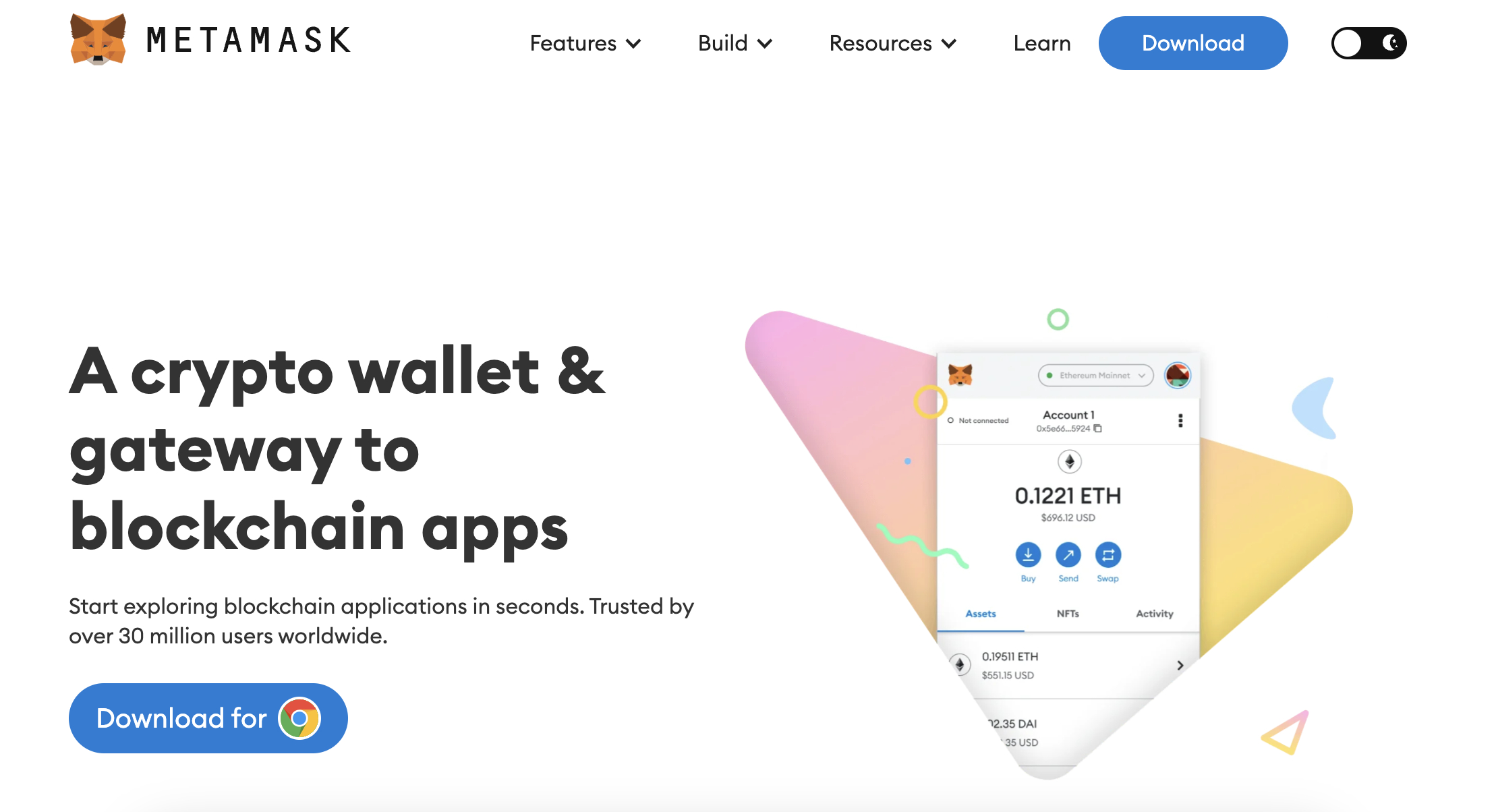
Those who prefer desktop devices can access MetaMask via a browser extension. Supported web browsers include Chrome, Edge, Firefox, Brave, and Opera. The main drawback of MetaMask is that it doesn't support Bitcoin. Compatible blockchain networks include Ethereum, Polygon, Binance Smart Chain, Avalanche, Aurora, Avalanche, Fantom, and Harmony.
Although MetaMask offers a user-friendly dashboard, the wallet only comes pre-installed with Ethereum. As such, you'll need to manually add new networks, which might be daunting for beginners. Nonetheless, MetaMask is mostly free to use. You won't pay fees to store or receive cryptocurrencies and there's no markup on outgoing transfers.
| Supported Networks | Ethereum, Polygon, Binance Smart Chain, Avalanche, Aurora, Avalanche, Fantom, and Harmony |
| Fee to Buy Crypto | 0.875% fee on in-wallet token swaps |
| Devices | iOS/Android app, browser extension for Chrome, Edge, Firefox, Brave, and Opera |
| Top Features | Free anonymous wallet with no markups on outgoing transfers, Supports thousands of tokens on multiple networks, Available as a mobile or browser extension |
Pros
- Established crypto wallet with over 30 million users
- Does not collect KYC information - remains anonymous at all times
- No fees to store or receive cryptocurrencies and no markups on transfers
- One of the best ERC20 wallets - all Ethereum tokens are supported
Cons
- 0.875% fee when swapping tokens
- Only ETH and MATIC can be staked
3. Trust Wallet - Mobile and Web-Based Wallet Supporting 100+ Blockchain Networks
Trust Wallet is one of the best anonymous crypto wallets for diversified investors. This self-custody wallet is compatible with over 100 blockchain networks and supports millions of cryptocurrencies and NFTs. This includes everything from Bitcoin, Solana, and Cardano to Ethereum, Binance Smart Chain, and Cosmos.
This means you can keep your entire cryptocurrency portfolio in one location. Founded in 2017, Trust Wallet is now used by over 70 million people. It comes as a mobile app for iOS and Android, plus a browser extension. This includes Chrome, Edge, Brave, and Opera - but not Firefox. Nonetheless, Trust Wallet is free to use and you won't pay markups on outgoing transfers.
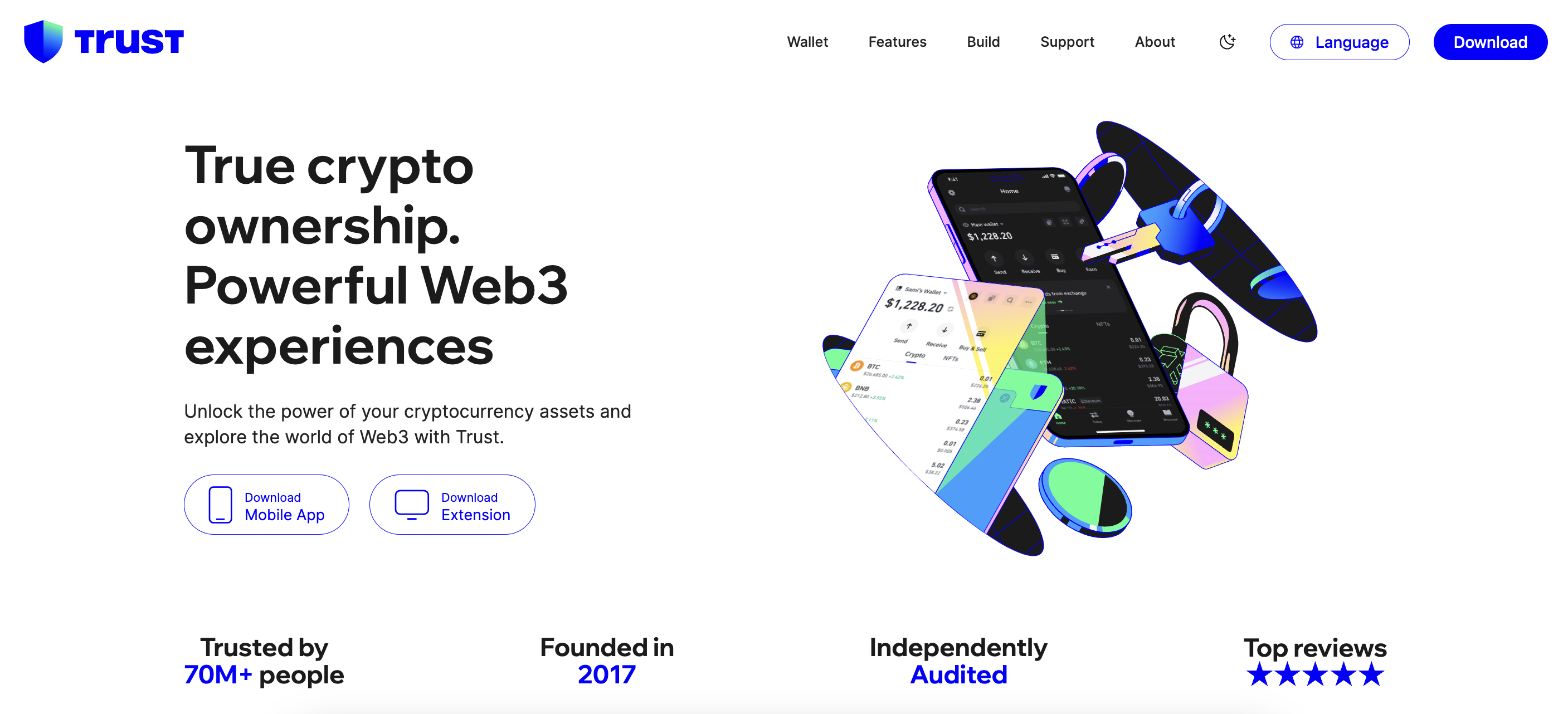
Moreover, Trust Wallet comes with plenty of built-in features, including staking. Some of the best staking coins supported include BNB, Solana, Tezos, Cronos, KAVA, and Polkadot. Staking APYs currently range from 2.5% to 36.1%. Trust Wallet also gives you seamless access to decentralized applications.
For example, you can connect to PancakeSwap and Uniswap anonymously to trade and swap tokens. OpenSea is also supported, allowing you to buy and sell NFTs. To set Trust Wallet up, you'll need to choose a password or PIN, depending on the device. You'll be presented with a backup passphrase, which consists of 12 words. This represents your unique private key.
| Supported Networks | More than 100 networks, including Bitcoin, Ethereum, Cardano, Solana, Cosmos, Binance Smart Chain, and Litecoin |
| Fee to Buy Crypto | No fees when swapping tokens within Trust Wallet |
| Devices | iOS/Android app, browser extension for Chrome, Edge, Brave, and Opera |
| Top Features | More than 100 networks and 10 million digital assets are supported, In-built staking tools with competitive APYs, Swap tokens without paying fees |
Pros
- Founded in 2017 and used by over 70 million traders
- Supports millions of digital assets across 100+ blockchain networks
- Swap tokens without paying any commissions
- Available as an app and browser extension
Cons
- Limited security features
- Browser extension doesn't support Firefox
4. Coinbase Wallet - Decentralized Crypto Wallet App With Full Anonymity and Private Key Ownership
Coinbase - the popular crypto exchange, also offers one of the best anonymous Bitcoin wallets. Although Coinbase is a centralized platform, Coinbase Wallet is a completely separate entity. In fact, Coinbase Wallet is a decentralized wallet that offers full anonymity. When you first set Coinbase Wallet up, you'll be provided with a 12-word backup phrase.
This is your private key and nobody, including Coinbase, can access it. On the flip side, this means that Coinbase won't be able to assist if you misplace your private key or the wallet is hacked. Coinbase Wallet comes as a mobile app, compatible with iOS and Android. It's free to download and use and is protected by a PIN or fingerprint ID.

Coinbase Wallet is another anonymous wallet that supports a huge range of cryptocurrencies. This includes Bitcoin, Dogecoin, Litecoin, BNB, Litecoin, and Solana. Coinbase Wallet also allows you to add custom tokens. For example, suppose you've just bought a new cryptocurrency that operates on the Ethereum blockchain.
All you'd need to do is add the project's unique smart contract address to Coinbase Wallet and transfer the tokens to your Ethereum address. Coinbase Wallet also allows you to connect to decentralized applications, such as SushiSwap, Uniswap, Curve, and OpenSea. This enables you to swap and earn tokens without leaving the Coinbase Wallet app.
| Supported Networks | Dozens of networks, including Bitcoin, Ethereum, Cardano, Solana, Optimism, Polygon, Binance Smart Chain, and Litecoin |
| Fee to Buy Crypto | Does not directly support token swaps - but you can connect to decentralized applications like Sushiswap and Uniswap |
| Devices | iOS/Android app, browser extension for Chrome |
| Top Features | Decentralized wallet app for iOS and Android, Supports the most popular blockchain networks, Add custom tokens via a smart contract address |
Pros
- Supports the best cryptocurrencies to buy - including Bitcoin, Ethereum, and BNB
- Self-custody storage - nobody can view or access your private keys
- Free to store and receive cryptocurrencies
- Supports decentralized applications like Uniswap and SushiSwap
Cons
- Only offers a browser extension for Chrome
- Some users might be concerned about the relationship between Coinbase and Coinbase Wallet
5. Electrum - Self-Custody Bitcoin Wallet for Desktop Devices With Solid Security Features
Launched in 2011, Electrum is considered one of the best anonymous Bitcoin wallets for desktop users. It offers proprietary desktop software for multiple operating systems, including Windows, Mac, and Linux. Electrum's underlying code is available on GitHub, so can be verified and monitored by experienced developers.
This established wallet only supports Bitcoin, so won't be suitable for diversified portfolios. Nonetheless, Electrum offers plenty of security features that ensure your Bitcoin tokens are safe at all times. For example, you can set up multisig permissions. In basic terms, this requires more than one device to sign transactions before any Bitcoin tokens leave Electrum.
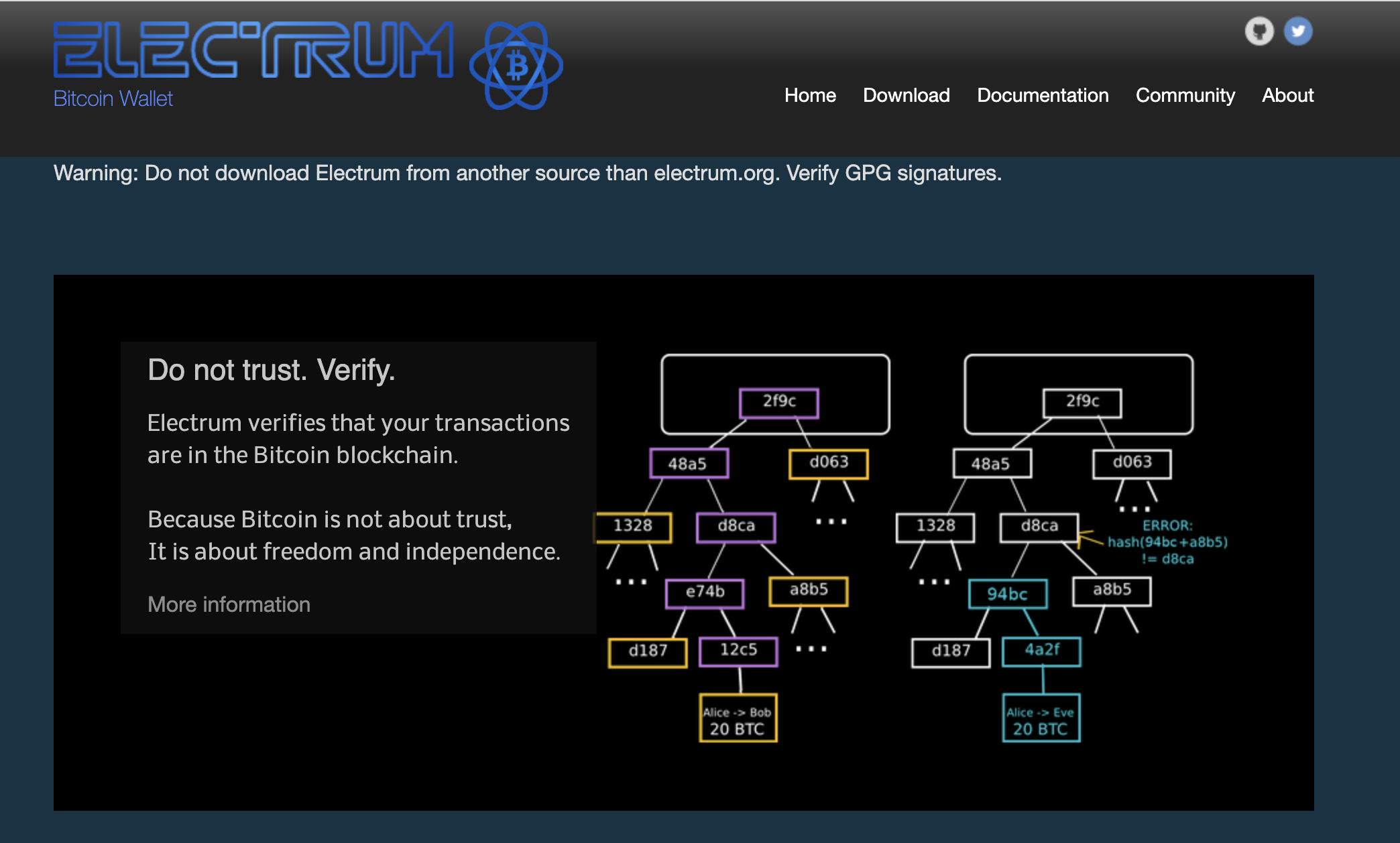
Therefore, if somebody was able to hack your private keys, they wouldn't be able to make transfers. What's more, Electrum allows you to keep your private keys offline in cold storage. You'd only need to bring the wallet online when sending transactions. As a decentralized wallet, Electrum servers can never go down - which is another solid safeguard.
In addition to desktop software, Electrum also offers a mobile app for Android. iOS is not covered, which will be a drawback for some. Unlike other anonymous Bitcoin wallets, Electrum doesn't offer in-built token swaps or staking tools. Instead, Electrum simply allows you to store, send, and receive transactions. Electrum is free to use and there are no markups on transaction fees. ,
| Supported Networks | Bitcoin |
| Fee to Buy Crypto | Not supported |
| Devices | Desktop software for Windows, Mac, and Linux. Android app. |
| Top Features | Launched in 2011, Wallet code is transparently posted on GitHub, Multisig permissions and cold storage |
Pros
- Anonymous and decentralized wallet for desktop users
- Software is compatible with Windows, Mac, and Linux
- Also offers a mobile app for Android smartphones
- Solid security features - including cold storage and multisig permissions
Cons
- Does not support any altcoins - Bitcoin only
- Hasn't released an app for iOS users
6. Coinomi - Multi-Device Crypto Wallet Supporting Over 125 Network Standards
Launched in 2014, Coinomi is another established crypto wallet that has a great reputation. Coinomi is compatible with multiple devices and operating systems. If you want to store crypto on your smartphone, Coinbase offers a mobile app for iOS and Android. Desktop users can download software for Windows, Mac, and Linux.
This is a self-custody wallet, so Coinomi never has access to your private keys. It's also decentralized, so Coinomi cannot block transactions or freeze balances. Coinomi supports over 125 blockchain networks, meaning millions of cryptocurrencies and NFTs. This includes popular cryptocurrencies with the most potential, such as Ethereum, TRON, and BNB.
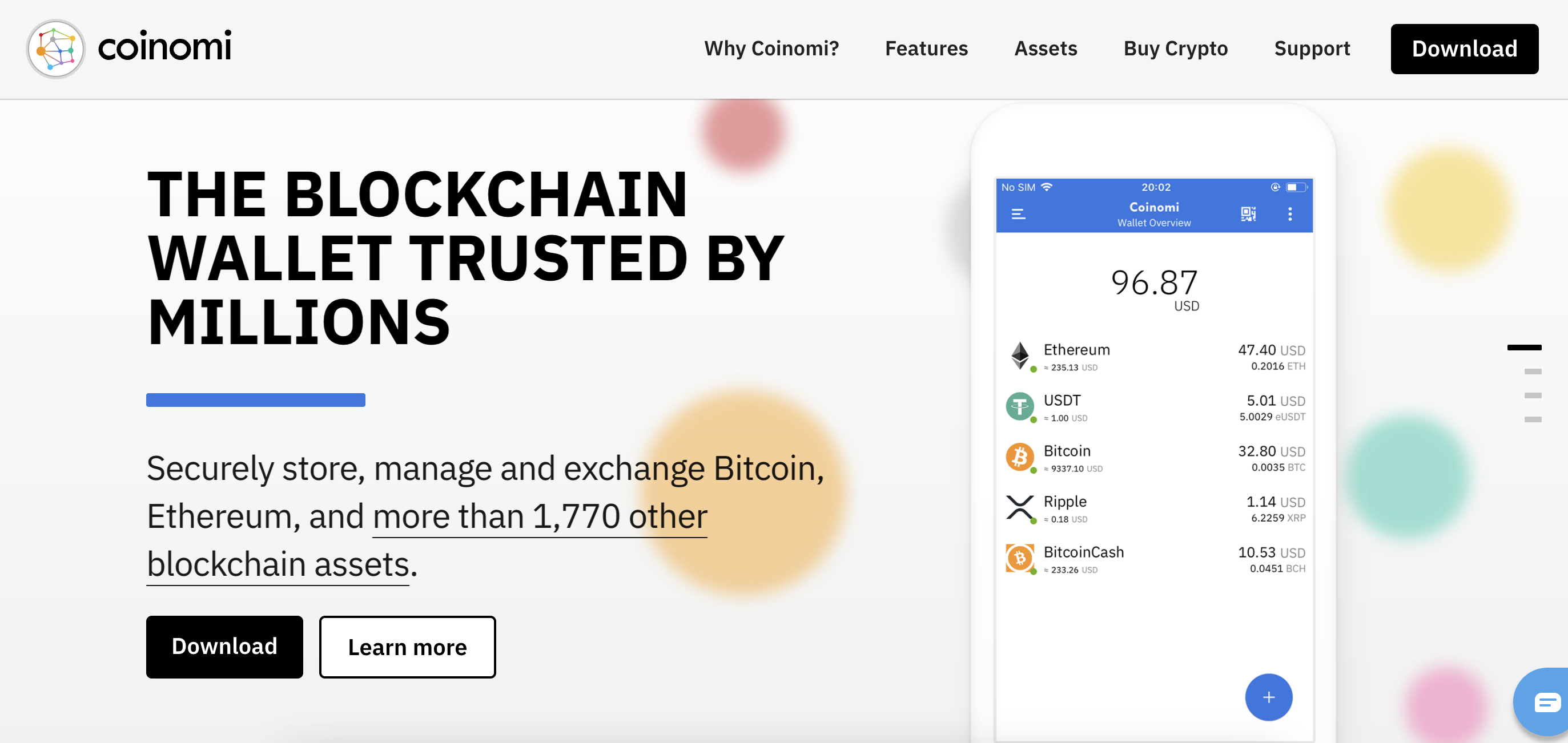
Coinomi also supports Bitcoin, Ethereum Classic, NEM, Monero, and Bitcoin Cash. Unlike many anonymous crypto wallets, Coinomi offers 24/7 customer support. This is available via the Coinomi app via live chat. Coinomi also offers in-wallet integrations with decentralized applications. This enables you to swap tokens and earn interest via staking.
| Supported Networks | More than 125 networks, including Bitcoin, Ethereum, XRP, Bitcoin Cash, Monero, and TRON |
| Fee to Buy Crypto | Does not directly support token swaps - but integrates with decentralized applications |
| Devices | iOS/Android app, desktop software for Windows, Mac, and Linux |
| Top Features | Available as a mobile app or desktop software, Supports over 125 blockchain networks, 24/7 in-wallet customer support via live chat |
Pros
- Great reputation - established in 2014
- More than 125 blockchains supported - including Bitcoin and XRP
- Offers live chat support within its wallet app
- Portfolio value can be viewed in 168 different currencies
Cons
- Doesn't offer a browser extension
- You'll need to connect to a decentralized application to swap tokens
7. Atomic Wallet - Multi-Asset Crypto Wallet App and Desktop Software With In-Built Staking Tools
If you're looking for anonymous crypto wallets for earning passive income, look no further than Atomic Wallet. Put simply, Atomic Wallet comes with an in-built staking tool that offers competitive APYs. For example, you can earn an APY of 5% on Ethereum, BNB, and TRON. KAVA and Cosmos offer even higher APYs at 19% and 22% respectively.
There's no requirement to reveal your identity when staking cryptocurrencies, enabling you to remain anonymous. Atomic Wallet is a user-friendly wallet that offers self-custody storage. Like many anonymous crypto wallets, you'll be provided with a unique 12-word backup phrase when getting started. Your private keys are encrypted and stored locally on your device.

Atomic Wallet offers a mobile app for iOS and Android smartphones. It also offers desktop software for Windows and Mac. Specialist operating systems are also supported, such as Fedora and Debian. Atomic Wallet comes with additional tools, such as token swaps and portfolio management. The latter displays the value of your cryptocurrencies in your local currency.
| Supported Networks | Dozens of blockchain networks, including Bitcoin, Cardano, Ethereum, Binance Smart Chain, Polygon, Litecoin, Monero, and Solana. |
| Fee to Buy Crypto | 0.5% above the exchange rate quoted by the respective liquidity provider |
| Devices | iOS/Android app, desktop software for Windows, Mac, Fedora, Debian, Ubuntu |
| Top Features | Competitive staking APYs of up to 22%, User-friendly dashboard with portfolio management tools, Huge range of cryptocurrencies are supported |
Pros
- Anonymous crypto wallet with in-built staking tools
- Earn competitive staking APYs of up to 22%
- Supports dozens of blockchains - including Bitcoin, Ethereum, and Monero
- No markups on outgoing transfers
Cons
- 0.5% surcharge on in-wallet token swaps
- Although fiat money deposits are supported - you will need to upload ID
8. MyEtherWallet - Store, Swap, and Stake ERC20 Tokens Anonymously
Launched in 2015, MyEtherWallet, or MEW, is an open-source wallet for Ethereum-based projects. It supports all ERC20 projects and allows you to add custom tokens. MyetherWallet is a self-custody wallet, so your private keys are in your possession only. The wallet comes as a mobile app for iOS and Android, and there are no fees to receive or store cryptocurrencies.
MyetherWallet doesn't charge additional markups when transferring tokens, so GAS fees go directly to the Ethereum blockchain. The main drawback of MyEtherWallet is that it doesn't support other cryptocurrency standards, such as Bitcoin and Litecoin. It does, however, offer support for Enkrypt, which you can connect with MyEtherWallet via a browser extension.
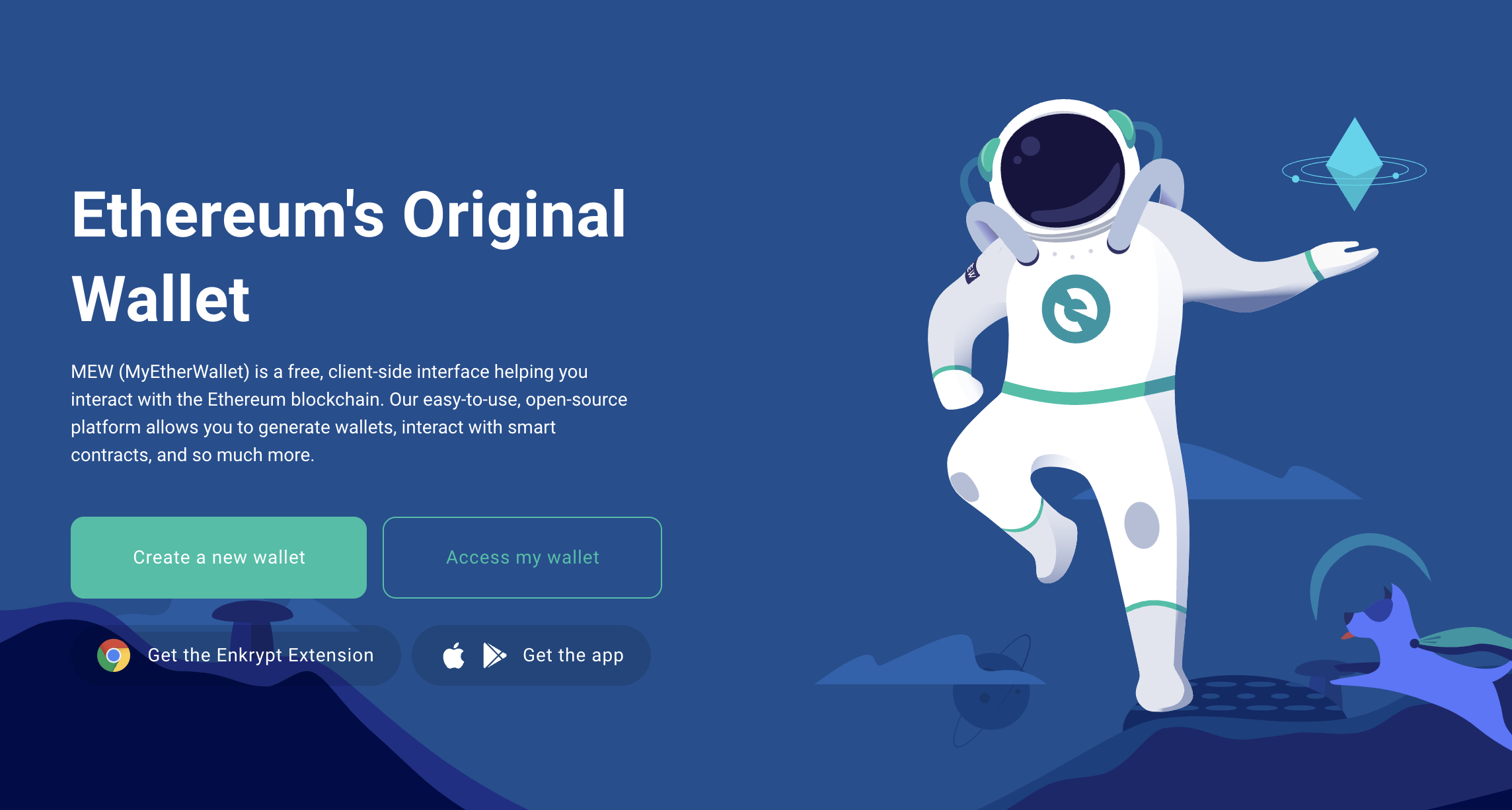
Enkrypt supports many other cryptocurrencies, allowing you to convert MyEtherWallet into a multi-asset wallet. MyEtherWallet also offers staking tools for Ethereum 2.0. It also integrates with decentralized applications like 1inch - enabling you to swap tokens at competitive exchange rates. MyEtherWallet also supports NFTs on the ERC721 standard.
| Supported Networks | Ethereum. For additional network standards, you'll need to connect MEW with Enkrypt via a browser extension |
| Fee to Buy Crypto | No additional markups on token swaps, but fees depend on the liquidity pool provider |
| Devices | iOS/Android app |
| Top Features | Established in 2015, Supports all ERC20 and ERC721 tokens, Open-source code for transparency and security improvements |
Pros
- One of the best anonymous crypto wallets for storing Ethereum-based tokens
- Open-source code allows developers to monitor potential security threats
- User-friendly mobile app for iOS and Android
- Supports Ethereum 2.0 staking for passive rewards
Cons
- You'll need to connect with Enkrypt to store non-Ethereum tokens
- Doesn't offer a browser extension or desktop software
9. Exodus - Private Bitcoin Wallet Supporting 50+ Blockchain Networks on Desktops, Mobiles, and Browsers
Exodus is a popular Bitcoin wallet that supports over 50 blockchain networks. This includes everything from Ethereum, Binance Smart Chain, and XRP to Solana, Cardano, and TRON. If a specific token isn't listed, you can add it to Exodus via its smart contract address. Exodus supports all device types, including mobiles, desktops, and browsers.
Compatible operating systems include iOS, Android, Mac, Windows, Chrome, and Brave. Once you've downloaded your preferred software, your private keys are stored locally - meaning they never leave your device. Exodus is also popular for keeping tabs on cryptocurrency valuations. Its portfolio management tools provide insights into how your investments are performing.
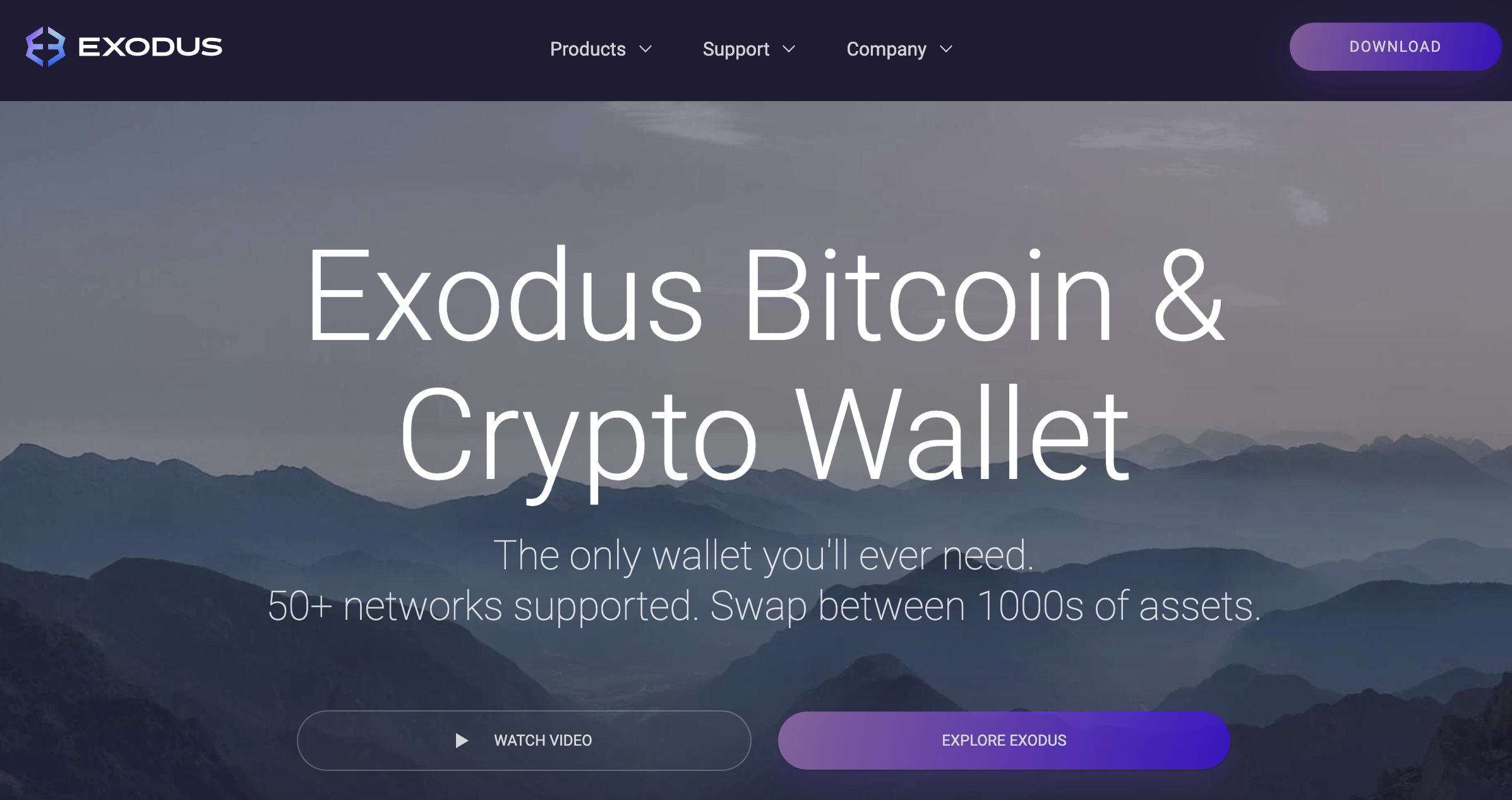
Exodus also connects with liquidity pools to offer in-wallet token swaps. Although fast and convenient, Exodus charges a markup on the exchange rate it receives. It doesn't publish these additional fees, so you'll need to assess the exchange rate before confirming a swap. Exodus also supports staking rewards; APYs are currently as high as 18.9%.
| Supported Networks | Over 50 blockchain networks, including Bitcoin, Solana, Binance Smart Chain, Cardano, and Ethereum |
| Fee to Buy Crypto | Charges an additional spread on the exchange rate it receives from liquidity providers. Its markup is not published |
| Devices | iOS/Android app. Desktop software for Windows and Mac. Browser extensions for Chrome and Brave |
| Top Features | Staking APYs of up to 18.9%, Compatible with desktops, mobiles, and web browsers, Supports over 50 blockchain networks |
Pros
- Multi-asset crypto wallet supporting over 50 networks - including Bitcoin and Solana
- Available on multiple devices and operating systems
- Private keys and transaction data are stored locally on your device
- In-built staking tools offer competitive APYs
Cons
- Charge an unpublished markup on token swaps
- Doesn't support Firefox browsers
10. iToken - Web 3.0 Crypto Wallet Supporting Decentralized Applications and Market Data
The final option to consider is iToken; a self-custody wallet app for iOS and Android. This is a relatively new crypto wallet that's backed by the Huobi exchange. That said, iToken offers decentralized storage, so Huobi doesn't have access to your data. What's more, you'll have full control of your private keys - which are stored on your smartphone.
iToken supports over 1 million digital assets across many popular blockchains. This includes Ethereum, Binance Smart Chain, Solaba, Avalanche, and TRON. iToken also gives you access to Web 3.0 products, including decentralized exchanges and NFT marketplaces. Simply load the in-app browser and swap, stake, and manage cryptocurrencies privately.
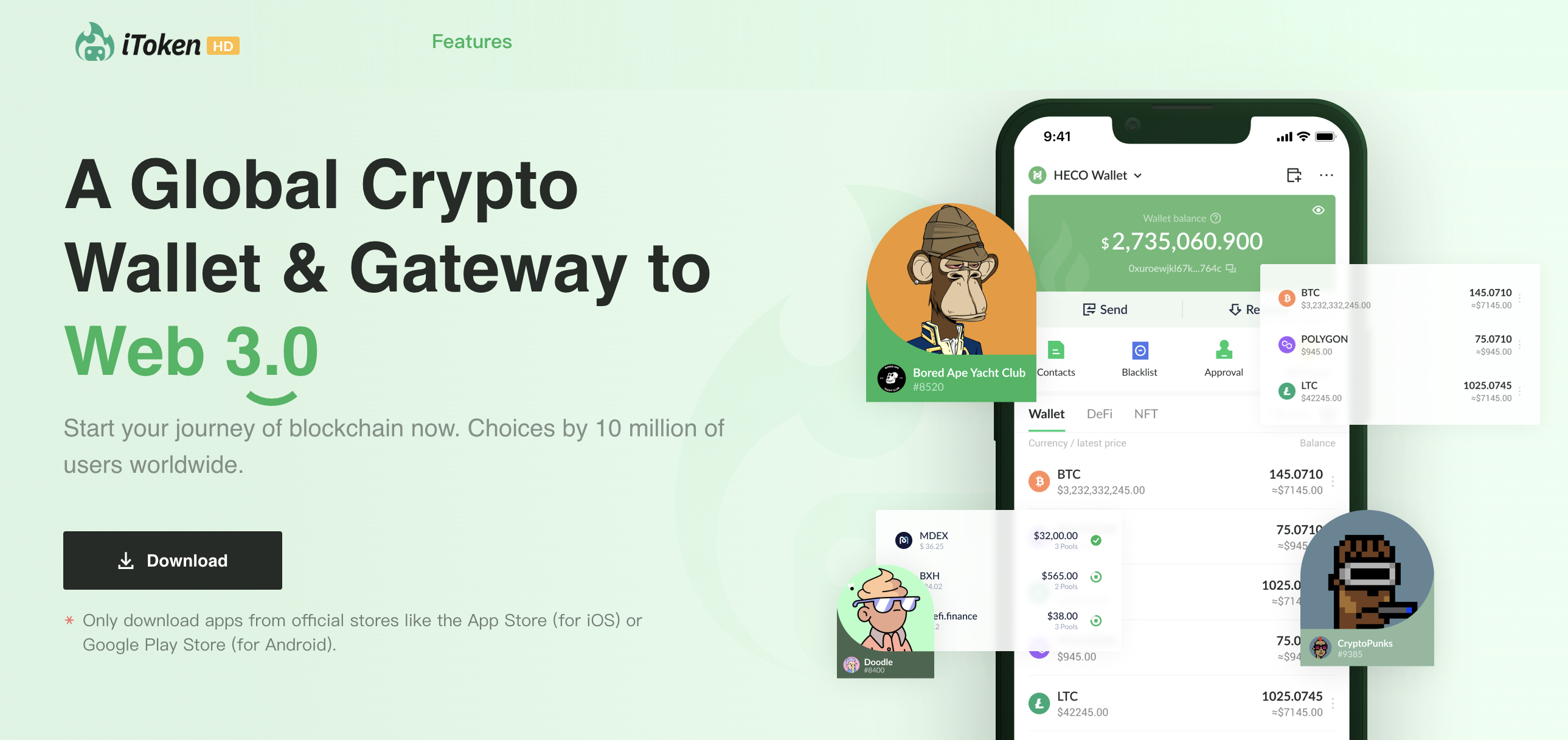
iToken also offers 24/7 customer support via live chat. This can help you navigate the Web 3.0 ecosystem for the first time. We also like that iToken offers real-time market analytics on your cryptocurrency portfolio. Prices are likely extracted from the Huobi exchange, which supports hundreds of markets.
| Supported Networks | Supports over 1 million digital assets on multiple networks, including Ethereum, Solana, and Binance Smart Chain |
| Fee to Buy Crypto | Determined by the decentralized application you're connected with |
| Devices | iOS/Android app |
| Top Features | Supports over 1 million digital assets, Real-time market analytics, In-app browser that offers private access to the Web 3.0 ecosystem |
Pros
- Free Web 3.0 wallet for iOS and Android
- Many blockchain networks are supported - covering cryptocurrencies and NFTs
- Used by over 10 million people
- Customer support is offered 24/7 via live chat
Cons
- No support for desktop devices
- 3.1/5 rating on the App Store
How Do Non KYC Wallets Work?
To under how anonymous crypto wallets work, we'll need to take a step back and discuss 'custodianship'. Put simply, there are two types of crypto wallet services available - custodial and non-custodial (also called self-custody).
Let's explore how each wallet type works.
Custodial wallets are offered by centralized providers. In most cases, this is a crypto exchange, such as Binance. The custodian is responsible for keeping your cryptocurrencies safe. However, there are some drawbacks.
For a start, custodian wallets rarely allow you to store cryptocurrencies anonymously. On the contrary, you'll likely need to go through a KYC process. This means your account and wallet must be verified via government-issued ID. What's more, custodial wallets do not give you access to your private keys.
This means that you never truly own your cryptocurrencies. There is a saying in the blockchain space - not your keys, not your coins.
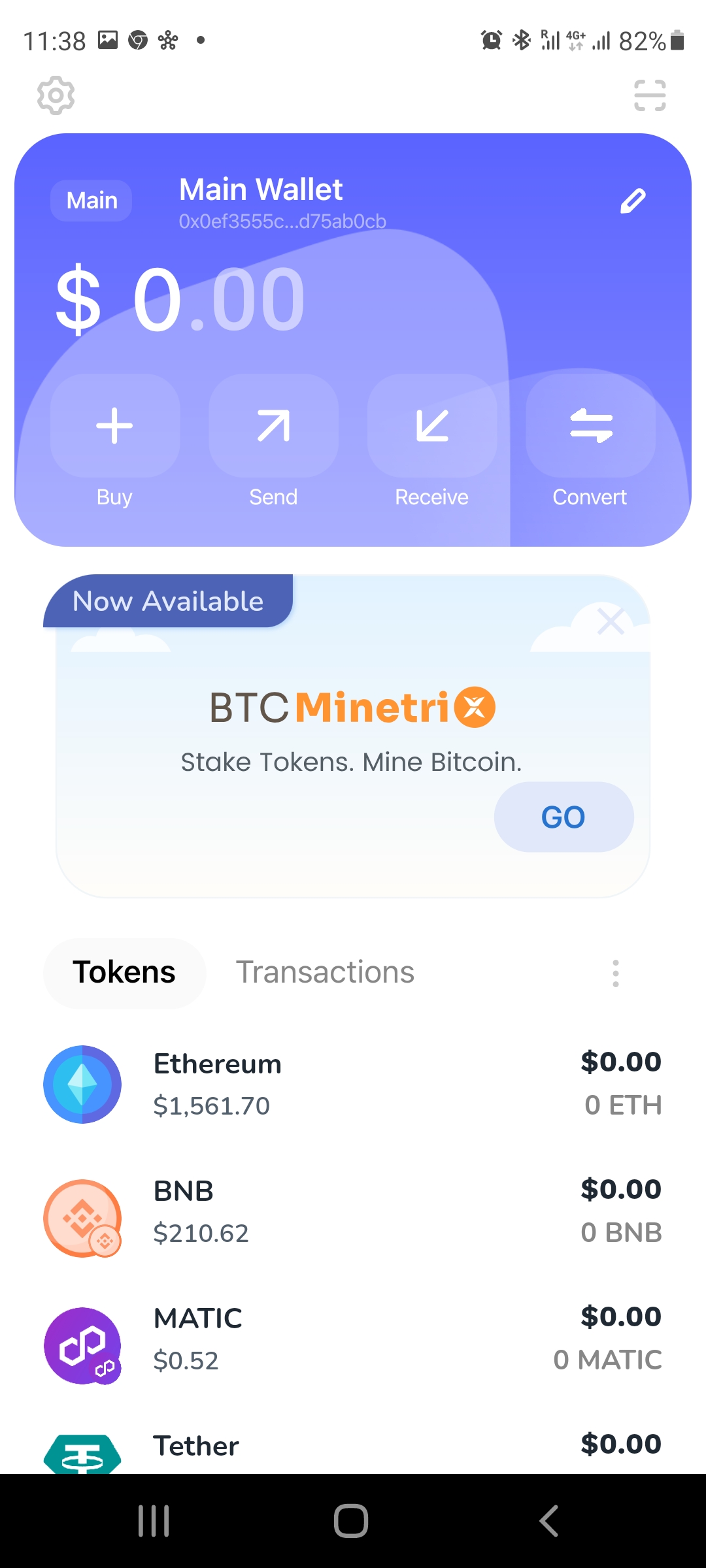
In contrast, non-custodial wallets offer an anonymous and private experience. You won't be required to enter any personal information and certainly won't be asked for KYC documents. Instead, you can store, send, and receive cryptocurrencies anonymously. Most importantly, non-custodial wallets give you full control of your private keys.
However, anonymous wallets also come with drawbacks. For example, suppose you have a mobile wallet and you forget your PIN. If you've also misplaced your private keys, you won't be able to access the wallet. As you're using a self-custody wallet, the provider cannot help you regain access. Therefore, you're 100% responsible for safeguarding your wallet.
Furthermore, although some anonymous Bitcoin wallets support fiat money services, this requires a KYC process. This won't be implemented by the wallet provider but by the third-party payment processor. Nonetheless, once you hand over your personal information and identity documents, you've lost your anonymity.
When choosing an anonymous wallet, you'll also need to select your preferred device type. For example, some wallets come as mobile apps for iOS and Android. Others come as desktop software for Windows and Mac. Anonymous wallets are also available as browser extensions for Chrome and Firefox.
Irrespective of your chosen device type, anonymous wallets allow you to send, receive, and store cryptocurrencies. The wallet will give you a unique blockchain address, which you'll need when receiving tokens. As anonymous wallets are decentralized, transactions can never be blocked. Nor can your wallet balance be frozen.
Advantages of Crypto Wallets Without ID Verification
In this section, we'll take a much closer look at the advantages of using a no KYC crypto wallet.
Full Control of Your Cryptocurrencies
We've established that anonymous crypto wallets offer a self-custody service. This means that only one person has access to the wallet's private keys - you. Without knowing the private keys, the wallet cannot be accessed. This means that you have full control of your cryptocurrencies.
After all, not even the wallet provider can access your funds. What's more, you avoid the risk of having transactions blocked or delayed. This isn't the case when using a custodial wallet, as you need to wait for the provider to approve transactions. This goes against the ethos of cryptocurrencies and blockchain technology.
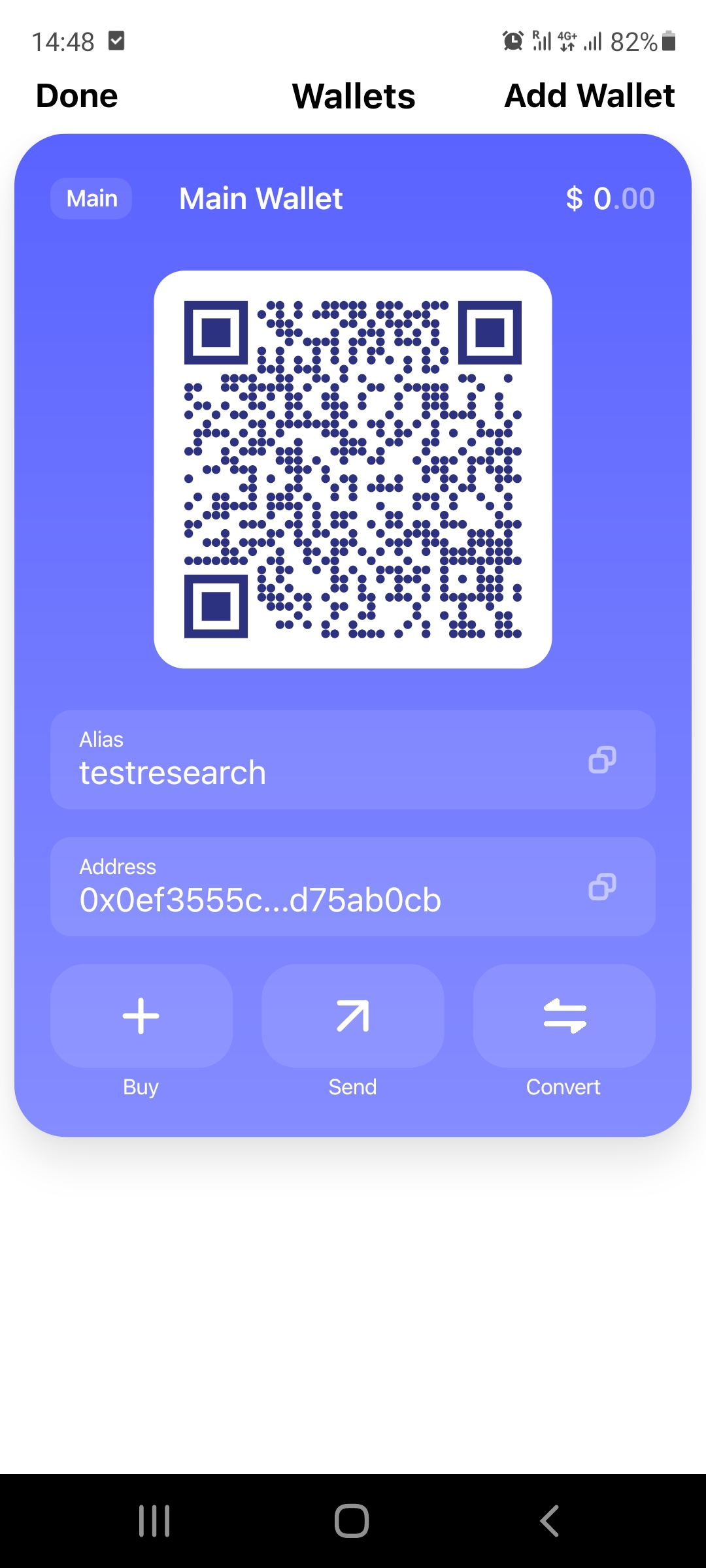
However, it's important that you keep your private keys safe. Should they fall into the wrong hands your wallet will be compromised and your cryptocurrencies stolen. Most anonymous wallets provide private keys as a 12-word passphrase. This makes it easier to write down and type in, should you need to regain access to your wallet.
Ultimately, crypto wallets with no KYC allow you to store and build wealth away from the traditional financial system. You don't need to trust that the provider is keeping your cryptocurrencies safe, as you're in full control. This has never been more important since the collapse of FTX - which resulted in billions of dollars in customer losses.
The best way to keep private keys safe is by writing them down on a sheet of paper. Keep the paper somewhere safe and private. Avoid writing your private keys down on a device that connects to the internet. If you do, the private keys will be vulnerable to remote hacking attempts.
No KYC Processes - Remain Anonymous
It goes without saying that anonymous Bitcoin wallets do not have a KYC process. You simply need to download your chosen wallet and transfer tokens to your unique address. No personal information will be collected by the provider. Using a VPN offers additional protection, as the wallet provider won't be able to see your IP address.
When you send or receive cryptocurrencies, transactions won't be attached to your identity. The blockchain only displays the sender's and receiver's wallet address, which is a long string of alphanumeric characters.
You won't benefit from the same levels of anonymity when using a custodial wallet.
- For example, suppose you register an account with Binance and purchase Bitcoin with a credit card.
- You'd need to provide personal information and KYC documents, such as a government-issued ID.
- You then download the Binance wallet app. Thereon, any wallet transfers that you make can be tracked to your real-world identity.
This is the case even if you transfer the Bitcoin tokens to an anonymous wallet. After all, you've already provided your personal data to Binance - so everything can be tracked.
Trade Crypto and Earn Interest Anonymously
If you're wondering how to buy Bitcoin anonymously with fiat money, your options will be limited. Due to anti-money laundering (AML) laws, fiat money providers must perform KYC procedures. This will be the case even if you're using an anonymous wallet.
That being said, you will be able to trade cryptocurrencies anonymously and without KYC checks.
For example, Best Wallet comes with an in-built decentralized exchange. This allows you to swap tokens without going through a centralized entity. For instance, suppose you're currently holding BNB in Best Wallet. However, you no longer want to hold BNB - you're now interested in Shiba Inu.
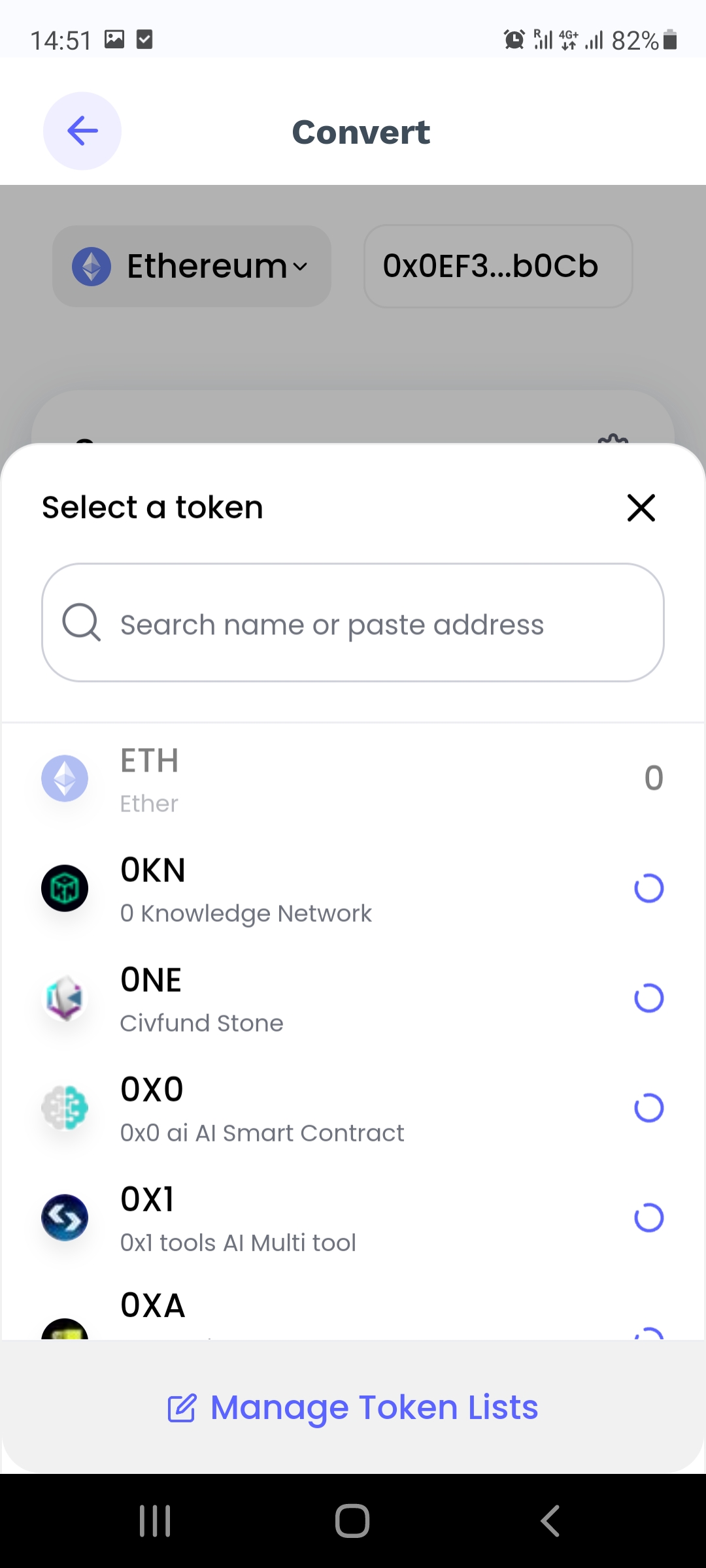
All you'd need to do is swap BNB for SHIB - directly in your Best Wallet dashboard. This means you don't need to transfer funds to an exchange.
What's more, some wallets allow you to stake cryptocurrencies anonymously. This means you can earn interest on your idle cryptocurrencies - putting your investments to work.
Our Methodology When Rating Anonymous Crypto Wallets
If you're still not sure which anonymous wallet is right for you, we'll now discuss our methodology when ranking the top providers.
Wallet Security
Security is very important when choosing an anonymous wallet. After all, you'll be 100% responsible for keeping your private keys safe. Nobody will be able to help you recover your funds if the wallet is hacked.
Security features will vary depending on the device type and the provider. For example, the Best Wallet app initially asks users to create a PIN. Fingerprint ID is also supported for additional protection.
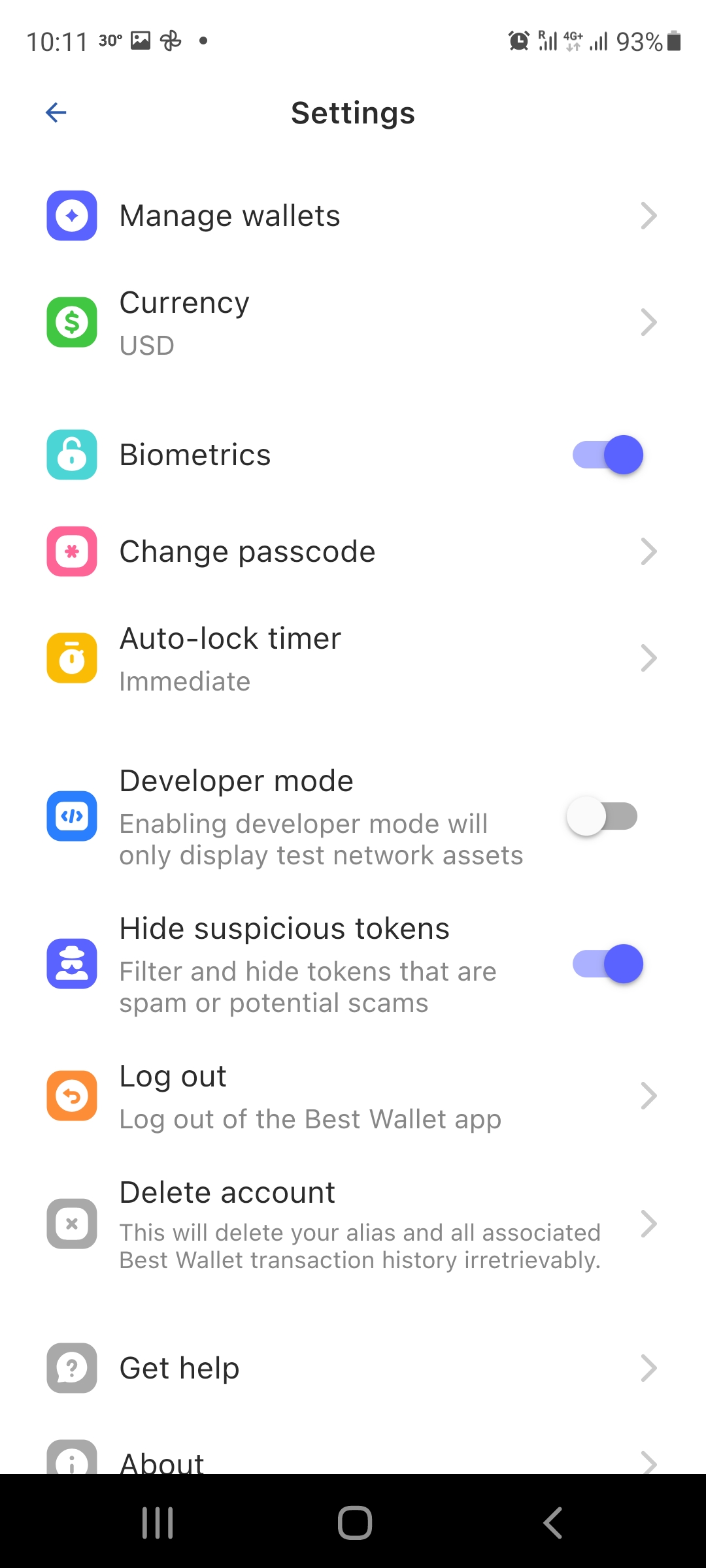
That's not all, Best Wallet also offers multi-factor authentication via your mobile device and email. This means that a hacker would not only need your fingerprint ID, but also access to your email account and mobile phone.
Another security feature to look for is multisig permissions. This requires confirmation from multiple devices when sending cryptocurrencies from the wallet.
Supported Networks and Custom Tokens
You'll need to explore what cryptocurrencies are supported by the anonymous wallet. For example, if you're holding Ethereum but the wallet only supports Bitcoin, you'll need to choose another option. If you're going to build a diversified portfolio, it's best to use a multi-asset wallet.
These are wallets that support multiple blockchain networks, such as Binance Smart Chain, Ethereum, and Solana. The best crypto wallets also support custom tokens. This allows you to manually add a cryptocurrency to the wallet if it isn't supported by default. Any tokens can be added, as long as the network is compatible.
For example, Best Wallet supports the Ethereum network. Suppose you're holding a new ERC20 token that's just launched. You can add the token to Best Wallet by pasting its unique contract address.
Wallet Fees
Most crypto wallets without ID verification are free to use. This means you can store and receive cryptocurrencies without paying fees. However, you will need to pay fees when transferring cryptocurrencies to another wallet.
This fee isn't charged by wallet providers - but the blockchain network. As such, the wallet merely passes these fees on. That being said, some crypto wallets without KYC add a markup to the blockchain fees, meaning that you're paying more than you should be. These wallet providers should be avoided.
Additional Wallet Features
The primary functions of anonymous wallets are to send, receive, and store cryptocurrencies away from centralized entities. However, some wallet providers offer additional features and tools.
For example, if you're looking to trade cryptocurrencies anonymously, Best Wallet comes with an in-app exchange. This is a decentralized exchange, so you won't need to provide any personal information. Simply choose which tokens you want to swap and Best Wallet will execute the trade at the best available rate.
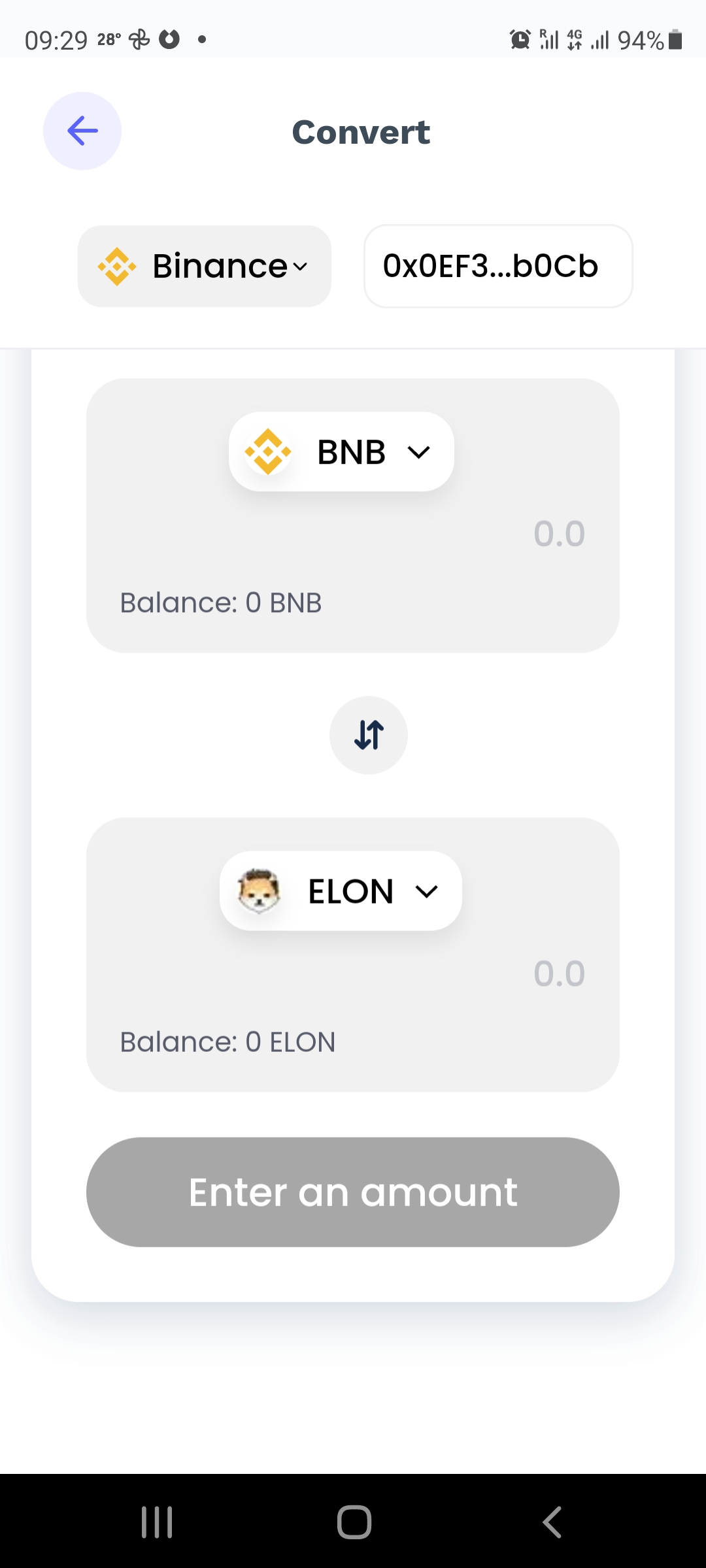
Another feature to look for is support for decentralized applications. This enables you to connect your wallet to popular exchanges like PancakeSwap and Uniswap. You can then earn interest by funding liquidity pools or staking. You can also connect to NFT marketplaces like OpenSea, not to mention the best play-to-earn games.
We also like anonymous crypto wallets that offer portfolio management tools. For example, if you've got lots of cryptocurrencies in your wallet, you'll want an overview of how much the portfolio is worth. Not only will you need real-time pricing but all valuations displayed in your preferred currency. This makes it easier to track the value of your investments.
Are Anonymous Bitcoin Wallets Legal?
In most circumstances, anonymous Bitcoin wallets are perfectly legal. However, cryptocurrencies are not legal in some countries, which would also cover wallets. This includes China, Bangladesh, and Algeria. But in the vast majority of the world, there are no restrictions on using anonymous wallets to store your cryptocurrency investments.
That said, some regulatory bodies are now honing in on no ID crypto wallets, putting pressure on centralized exchanges to track transactions.
For example, the European Union is passing legislation that will cover crypto wallets. In a nutshell, centralized wallet providers must log crypto transfers above €1,000 - even if they engage with self-custody wallets. That said, the new rules will have little impact when transfers are made exclusively between self-custody wallets, as they're completely anonymous.

Similarly, the UK recently introduced new regulations on custodial crypto wallet providers (e.g. exchanges). The 'Travel Rule' requires wallet providers to obtain the sender and receiver's name when facilitating transfers. Once again, these rules will have little impact on anonymous wallets that offer self-custody storage.
Crucially, no ID crypto wallets are merely software that sits between you and the blockchain. The cryptocurrencies aren't actually stored in the wallet itself. Moreover, self-custody wallet providers do not have access to your private keys. Therefore, they can't block or freeze transactions, let alone obtain your real-world identity.
Conclusion
Not only do anonymous wallets allow you to store cryptocurrencies without revealing your identity, but you'll be in full control of your private keys. Overall, we rate Best Wallet as the leading crypto wallet without ID verification.
Best Wallet - which comes as a mobile app, doesn't collect any personal data or KYC documents. You can store, trade, and earn cryptocurrencies anonymously, and you'll benefit from solid security features. Best Wallet is free to download on iOS and Android.
References
- https://www.finra.org/rules-guidance/key-topics/aml
- https://www.euronews.com/next/2022/08/25/bitcoin-ban-these-are-the-countries-where-crypto-is-restricted-or-illegal2
- https://www.swift.com/your-needs/financial-crime-cyber-security/know-your-customer-kyc/kyc-process
- https://ethereum.org/en/developers/docs/standards/tokens/erc-20/
- https://www.reuters.com/technology/exclusive-behind-ftxs-fall-battling-billionaires-failed-bid-save-crypto-2022-11-10/
- https://www.europarl.europa.eu/news/en/press-room/20230414IPR80133/crypto-assets-green-light-to-new-rules-for-tracing-transfers-in-the-eu
- https://www.cnbc.com/2023/04/20/eu-lawmakers-approve-worlds-first-comprehensive-crypto-regulation.html
- https://assets.publishing.service.gov.uk/government/uploads/system/uploads/attachment_data/file/1133404/TR_Privacy_edits_Future_financial_services_regulatory_regime_for_cryptoassets_vP.pdf
FAQs
Which crypto wallets don't need KYC?
There are many reputable and secure crypto wallets that don't require personal information or KYC documents. Examples include Best Wallet, MetaMask, Trust Wallet, and Electrum.
Does Exodus require KYC?
Exodus is a self-custody wallet that doesn't require KYC to store, send, or receive cryptocurrencies. However, KYC will be required if you want to buy cryptocurrencies with a debit/credit card.
Can I transfer crypto without KYC?
Yes, if you're using a self-custody wallet, you can transfer crypto without KYC. However, an increasing number of custodian wallet providers now have verification processes in place.
What is the best anonymous Bitcoin wallet?
We rate Best Wallet as the best anonymous Bitcoin wallet. You can store, send, and receive, thousands of cryptocurrencies privately via its iOS and Android app.
 cryptonews.com
cryptonews.com
